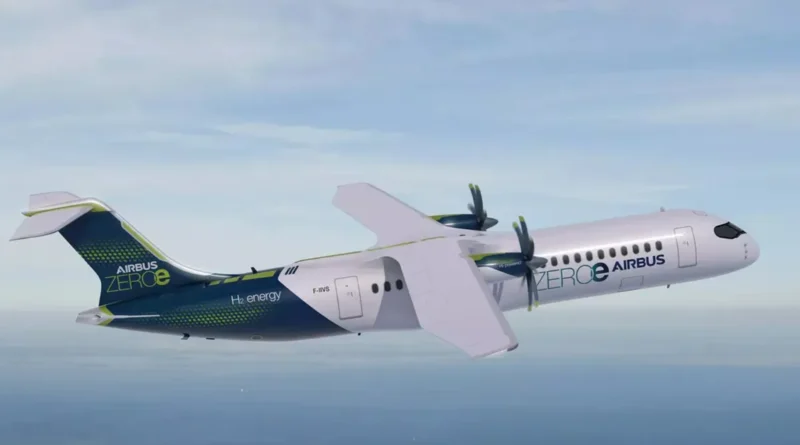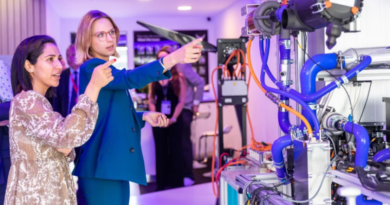Airbus’s ZEROe: First engine fuel cell powers up for hydrogen flight
Airbus has achieved a significant milestone on the journey toward hydrogen-powered flight by successfully activating its first ZEROe engine fuel cell.
In late 2023, the iron pod, a pivotal component of Airbus’s electric concept aircraft, was powered by the ZEROe teams.
This innovative hydrogen-propulsion system integrates the hydrogen fuel cell system, the essential electric motors required for propeller rotation, and the necessary cooling and control units.
Achieving a successful power output of 1.2 megawatts marks a significant milestone on Airbus’ ZEROe roadmap, aiming to deploy a hydrogen-propulsion aircraft into commercial service by 2035.
Significant advancement
In 2020, Airbus unveiled four hydrogen-powered aircraft concepts to the public. Among these, three utilized hydrogen combustion and hybrid engines, while the fourth employed a fully electric system, integrating hydrogen fuel cells and a propeller propulsion mechanism.
These fuel cells operate by converting hydrogen into electricity through a chemical process, with water vapor as the sole emission.
Recognizing the immense potential of hydrogen fuel cells in aviation decarbonization, Airbus prioritized its exploration for the ZEROe demonstrator.
However, a significant challenge arose: existing hydrogen fuel cells on the market needed more energy output for aircraft propulsion while maintaining acceptable weight levels.
To address this, Airbus established Aerostack in October 2020, a joint venture with ElringKlinger tasked with developing high-performance hydrogen fuel cell stacks for ZEROe aircraft.
Extensive fuel cell system testing occurred at Ottobrunn, Germany, near Munich, within the E-Aircraft System House (EAS), Europe’s largest facility for testing alternative propulsion systems and fuels.
Here, crucial components of the propulsion system underwent rigorous testing, setting the groundwork for the project’s advancement.
In June 2023, Airbus announced the successful completion of the hydrogen fuel cell system’s testing, achieving its full power capacity of 1.2 megawatts.
According to Airbus, this milestone marked the aviation industry’s most potent fuel cell test for large-scale aircraft, paving the way for the next phase: integrating the complete propulsion system with the electric motor.
In late 2023, following the successful testing of the fuel cell system at 1.2 megawatts in June and the powertrain at 1 megawatt in October, a pivotal moment arrived: the initial activation of the electric motors within the iron pod, synchronized with the hydrogen fuel cells.
This event marked a crucial step forward in the project’s progress and signified the successful integration of essential components essential for hydrogen propulsion.
“We measure how the propulsion system as a whole works by testing the power needed for several different flight phases, such as takeoff, where we are reaching maximum power levels, and cruising when we use less power but over a longer period of time,” said Hauke Peer-Luedders, Head of Fuel Cell Propulsion System for ZEROe, in a statement.
Crucial phase
Key to enabling the next stages of the project is the observation of how the various systems interact during testing. This process is instrumental in understanding the adjustments necessary to render the technology flight-worthy.
This meticulous examination gives insights into the intricacies of system integration and performance, guiding the refinement process essential for achieving airworthiness.
Throughout 2024, testing of the initial version of the iron pod will continue. Following its conclusion, the ZEROe team will optimize the propulsion system’s size, mass, and qualifications to align with flight requirements.
These qualifications encompass the system’s response to various factors such as vibration, humidity, and altitude, according to Airbus.
Upon the completion of optimizations and assessments, the fuel cell propulsion system will be integrated into the ZEROe multimodal flight test platform, designated as MSN001, which notably marks the first-ever A380 manufactured by Airbus.
Subsequently, rigorous ground testing of the integrated systems will ensue. This phase will culminate in a pivotal stage: the in-flight testing of the systems aboard the A380, an event currently slated for 2026.
Source : interestingengineering.com




